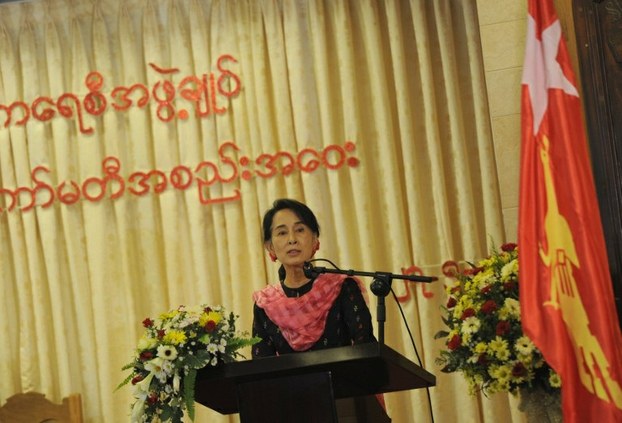Myanmar: Suu Kyi denounces two-child limit for Rohingyas
| Publisher | Radio Free Asia |
| Publication Date | 27 May 2013 |
| Cite as | Radio Free Asia, Myanmar: Suu Kyi denounces two-child limit for Rohingyas, 27 May 2013, available at: http://www.refworld.org/docid/51b0457e18.html [accessed 23 January 2017] |
| Disclaimer | This is not a UNHCR publication. UNHCR is not responsible for, nor does it necessarily endorse, its content. Any views expressed are solely those of the author or publisher and do not necessarily reflect those of UNHCR, the United Nations or its Member States. |
2013-05-27
Myanmar opposition leader Aung San Suu Kyi on Monday slammed a local policy in Rakhine state that bans Rohingya families from having more than two children, voicing rare comments defending the rights of the Muslim minority group.
 Aung San Suu Kyi delivers a speech at a National League for Democracy meeting in Yangon, May 27, 2013. AFP
Aung San Suu Kyi delivers a speech at a National League for Democracy meeting in Yangon, May 27, 2013. AFP
The National League for Democracy leader, who faced criticism from international rights groups for not speaking up for Rohingyas' rights following ethnic violence in Rakhine last year, said that if reports of the policy were true, it would amount to a violation of human rights.
Authorities in Rakhine state have said in recent weeks that the two-child limit is being enforced in Rakhine's Maungdaw and Buthidaung townships to curb Rohingya population growth, but have given few details on how the measure is being implemented.
Speaking after an NLD meeting in Yangon, Aung San Suu Kyi told reporters she could not confirm whether the policy was in place, but said such a measure would be illegal.
"It is discriminatory and is not in line with human rights," she said. "If it is true, it is against the law."
Stateless group
The two-child limit only applies to Rohingyas, a stateless group widely considered in Myanmar to be illegal immigrants from Bangladesh even though they have lived in the country for generations.
Though they are a small, unrecognized minority in Myanmar and Rakhine state, Rohingyas make up most of the population in Buthidaung and Maungdaw, which are also home to a small number of Buddhist Rakhines.
In April, a panel probing last year's clashes between Buddhists and Muslims in the state recommended family planning education be provided to Rohingyas, saying their "rapid population growth" had been a factor fueling the unrest.
The violence, which broke out in June and October last year, left nearly 200 people dead and some 140,000 displaced.
Most of the victims were Rohingya, many of whom remain in camps they are not allowed to leave.
Rights groups accused Myanmar authorities of complicity in "ethnic cleansing" against the Rohingya and criticized Aung San Suu Kyi for failing to stand up for the minority group, who face a variety of heavy-handed restrictions.
A longtime democracy campaigner who spent years under house arrest under Myanmar's former military junta, Aung San Suu Kyi has been a key advocate for government reforms as the country emerges from decades of military misrule.
Reported by RFA's Burmese Service. Written in English by Rachel Vandenbrink.
Link to original story on RFA website
